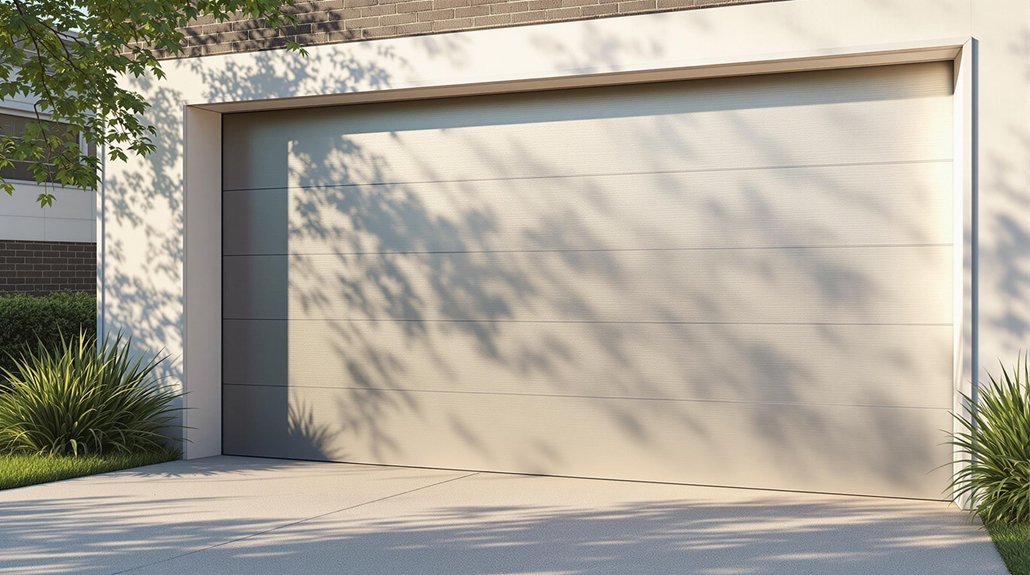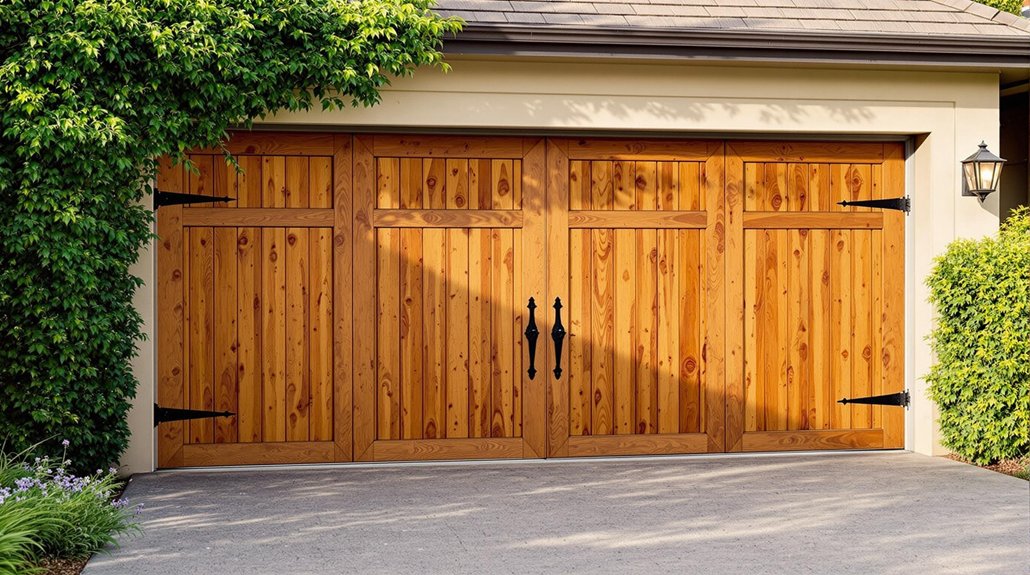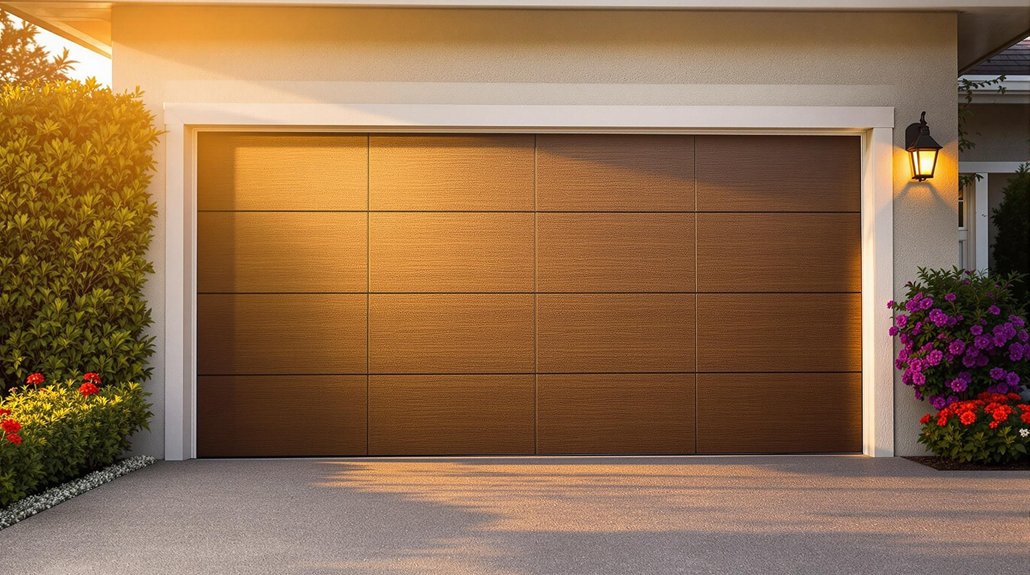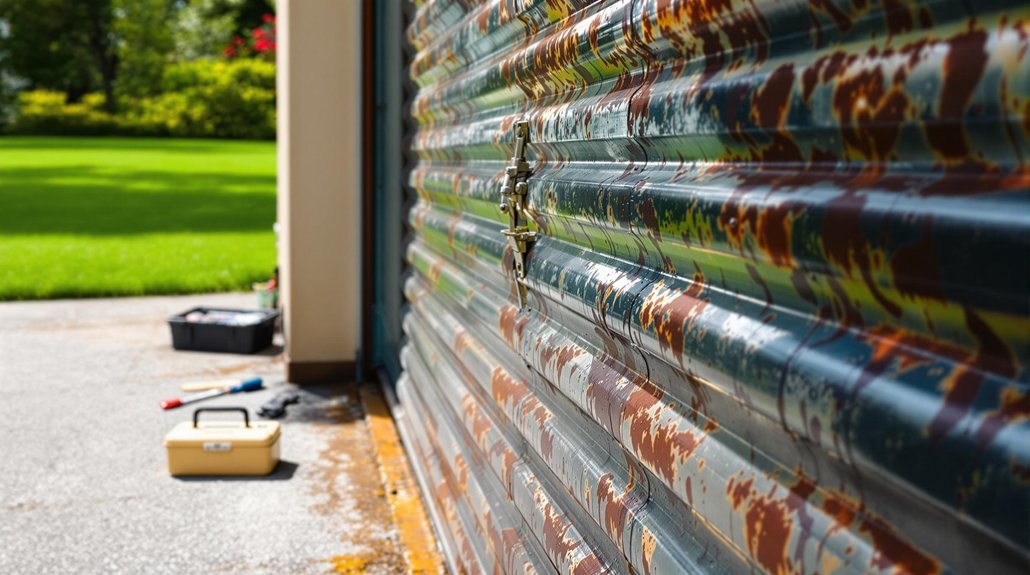The least expensive garage door material is typically steel. Steel doors are known for their strength and durability, making them a practical choice for many homeowners. They require low maintenance and have an initial cost that is often lower than other materials like wood or aluminum. While wood offers a classic look, it tends to be more expensive and requires regular upkeep. In contrast, aluminum and fiberglass doors fall somewhere in between in price. For more insights on garage door materials and associated costs, additional information is available to guide your decision.
Key Article Highlights
- Steel doors are generally the most affordable option with low initial costs and minimal maintenance requirements.
- Aluminum doors offer a cost-effective alternative, especially in coastal areas, balancing price and durability.
- Wood doors tend to be the most expensive due to higher material costs and ongoing maintenance needs.
- Fiberglass doors fall in the mid-range for pricing, offering a balance between aesthetics and durability.
- Installation costs can vary by material, impacting overall expenses and should be considered for budget planning.
Overview of Garage Door Materials
Garage doors come in various materials, each offering unique benefits and drawbacks. Common garage door types include steel, wood, aluminum, and fiberglass. Each material has its own set of advantages that can influence your choice.
Steel is a popular option due to its strength and durability. It can withstand harsh weather and resist dents, making it a low-maintenance choice. Wood provides a classic look and can be customized easily. However, it requires regular upkeep to prevent rot and warping. Aluminum is lightweight and resistant to rust, making it a practical choice for coastal areas. Its lower cost compared to steel can be appealing, but it may not offer the same level of insulation. Fiberglass is another option that is resistant to dents and corrosion. It can mimic the look of wood but is lighter and easier to maintain.
Understanding these material benefits is essential for selecting the right garage door for your home. Each type has its own features that cater to different needs and preferences. Consider factors like climate, maintenance requirements, and appearance when choosing the best material for your garage door.
Cost Comparison of Materials
When comparing garage door materials, it is essential to evaluate their pricing. Different materials come with varying initial costs, as well as long-term investment factors. Additionally, maintenance and repair costs can greatly impact the overall expense over time.
Material Pricing Overview
A variety of materials are available for garage doors, each with different price points. Common materials include steel, wood, aluminum, and fiberglass. Steel is often the most affordable option. It combines low cost with good material durability. However, installation costs can vary based on the type of steel and design chosen.
Wood garage doors provide a classic look but tend to be more expensive. They require regular maintenance, which adds to long-term costs. Aluminum is lightweight and usually priced between steel and wood. It offers decent material durability but can be less durable than steel.
Fiberglass doors are generally in the mid-range price category. They are resistant to dents and do not require painting, making them a cost-effective choice in the long run. Each of these materials has unique installation costs that can impact the final price.
Long-Term Investment Considerations
Evaluating the long-term investment of different garage door materials is essential for homeowners. The choice of material affects not only the initial cost but also long-term savings and overall investment value. Understanding how various materials perform over time can guide homeowners in making informed decisions.
Here is a comparison of common garage door materials based on cost and longevity:
| Material | Average Lifespan (Years) |
|---|---|
| Steel | 15-30 |
| Wood | 10-20 |
| Aluminum | 20-25 |
| Fiberglass | 20-30 |
Steel doors often have a lower upfront cost but may require more maintenance, affecting long-term savings. Wood doors provide aesthetic appeal but can suffer from rot, impacting investment value. Aluminum and fiberglass doors offer durability and longer lifespans, making them potentially more cost-effective over time.
Maintenance and Repair Costs
Maintaining a garage door is essential for its longevity and functionality. Different materials have varying maintenance and repair costs. Wood doors often require more upkeep, as they are prone to warping and rotting. This leads to a higher repair frequency and additional costs. On the other hand, steel doors are durable and require less frequent repairs, making them more cost-efficient in the long run.
Vinyl doors are also a good option, as they resist dents and do not require painting. This results in lower maintenance costs compared to wood. However, if a vinyl door does get damaged, repairs can be expensive since they may need to be replaced entirely.
Aluminum doors offer a balance between weight and durability. They are less prone to rust but can dent easily. Overall, aluminum doors may have a moderate repair frequency, impacting their cost efficiency.
When comparing materials, consider long-term maintenance and repair costs. Investing in a material with lower repair frequency will save money over time. Ultimately, choosing the right garage door material can lead to significant savings in maintenance and repair expenses.
Steel Garage Doors

Steel garage doors are a popular choice for homeowners seeking durability and security. They offer an excellent balance of strength and affordability. Steel durability is one of the main reasons why many people choose this material. Unlike wood, steel does not warp or crack, making it a long-lasting option.
In addition to strength, steel garage doors can be designed for insulation. Steel insulation helps to maintain a stable temperature inside the garage. This feature is particularly beneficial in extreme weather conditions. Insulated doors can also improve energy efficiency in your home.
Another advantage of steel garage doors is their low maintenance requirements. They are resistant to rust and corrosion, especially when treated with a protective coating. This allows homeowners to spend less time on upkeep compared to other materials.
Steel garage doors are available in various styles and colors, allowing for customization to match the home's exterior. Their combination of security, durability, and insulation makes them a wise choice for many homeowners. Overall, steel garage doors provide an effective solution for those looking to enhance their property while keeping costs reasonable.
Vinyl Garage Doors
Vinyl garage doors offer a cost-effective solution for homeowners seeking durability. They require minimal maintenance compared to other materials, making them an attractive option. Additionally, vinyl doors come in various designs and colors, providing aesthetic versatility to fit different home styles.
Cost-Effective Durability
When considering garage door materials, many homeowners find that vinyl offers a compelling combination of cost-effectiveness and durability. Vinyl garage doors provide excellent cost efficiency. They are less expensive upfront compared to many alternatives. Additionally, they require minimal maintenance, which saves homeowners money over time.
The material longevity of vinyl doors is impressive, making them a smart choice for long-term investment. Here are three key benefits of vinyl garage doors:
- Weather Resistance: Vinyl does not warp, crack, or fade easily. It withstands various weather conditions without significant wear.
- Impact Resistance: These doors are less likely to dent compared to metal. This durability keeps them looking new for longer.
- Insulation Properties: Many vinyl doors offer good insulation, which can help reduce energy costs.
Maintenance Requirements
Maintaining vinyl garage doors is straightforward and requires minimal effort. These doors are designed to withstand various weather conditions and resist fading. Routine upkeep mainly involves cleaning and inspecting the door. A simple wash with soap and water can keep the surface looking new. It is important to remove dirt, grime, and any debris that may gather.
Inspecting the door regularly helps to guarantee it operates smoothly. Check for any signs of wear or damage, especially around the hinges and tracks. Unlike wooden doors, vinyl doors do not require painting or special treatments, which reduces maintenance tasks considerably.
Repair frequency for vinyl garage doors is typically low. If repairs are needed, they are often limited to minor fixes such as replacing a handle or adjusting the tracks. In most cases, a professional can handle these repairs quickly and efficiently. Overall, vinyl garage doors offer a hassle-free maintenance experience, making them a practical choice for homeowners. With proper care, these doors can last for years, providing both functionality and value.
Aesthetic Versatility
The aesthetic versatility of vinyl garage doors makes them an attractive option for homeowners. These doors not only provide functionality but also enhance the visual appeal of a property. Homeowners can select from a wide range of color options, ensuring that their garage door complements their home's exterior.
Vinyl garage doors offer significant design flexibility, allowing for various styles to suit different architectural tastes. Here are three key aspects of their aesthetic versatility:
- Custom Colors: Vinyl doors can be found in numerous colors, from classic whites to bold hues. This allows homeowners to match their garage door with their home's façade.
- Variety of Textures: Homeowners can choose from smooth finishes or textured appearances that mimic wood or other materials. This enhances the overall look of the door.
- Unique Designs: Vinyl garage doors come in various styles, including traditional raised panels or modern designs. This diversity allows homeowners to express their personal style effectively.
Wood Garage Doors

Wood garage doors are often chosen for their natural beauty and versatility. They enhance the curb appeal of a home with their unique wood aesthetics. Available in various styles and finishes, wood doors can complement different architectural designs.
In addition to aesthetics, wood garage doors offer excellent durability. When properly maintained, they can withstand the elements and last for many years. However, it is crucial to take into account the care required to keep them in prime condition.
Here is a brief comparison of common wood materials used for garage doors:
| Wood Type | Advantages |
|---|---|
| Cedar | Naturally resistant to decay, great insulation |
| Redwood | Strong and durable, beautiful grain |
| Pine | Cost-effective, easy to paint or stain |
| Mahogany | Luxurious look, excellent durability |
Aluminum Garage Doors
Aluminum garage doors are a popular choice for homeowners seeking a balance of affordability and durability. These doors offer several advantages, making them an attractive option for many. One significant benefit is their lightweight nature, which enhances ease of use. Additionally, aluminum is resistant to rust and corrosion, contributing to aluminum durability over time.
When considering aluminum garage doors, homeowners should note the following key features:
- Affordability: Aluminum doors are generally less expensive than other materials, making them a cost-effective solution.
- Insulation: Many aluminum garage doors come with options for aluminum insulation, improving energy efficiency and helping to maintain stable temperatures.
- Variety: Aluminum doors are available in various styles and colors, allowing homeowners to customize their appearance to fit their home's aesthetic.
Fiberglass Garage Doors

Among the various options for garage doors, fiberglass stands out as a versatile and cost-effective choice. Fiberglass garage doors are known for their lightweight nature, making them easy to operate. One of the key fiberglass benefits is their resistance to rust and corrosion. This makes them ideal for regions with high humidity or coastal environments. Additionally, fiberglass can mimic the appearance of wood, providing aesthetic appeal without the maintenance that wood requires.
However, fiberglass also has its drawbacks. While it is durable, it can be prone to cracking if subjected to heavy impacts. This can be a concern in areas with extreme weather or heavy snowfall. Additionally, fiberglass doors may not provide the same level of insulation as steel or insulated wood options. This could lead to higher energy costs for homeowners in colder climates.
Factors Affecting Cost
While various materials can influence the overall cost of a garage door, several key factors play a significant role in determining the final price. Understanding these cost factors can help you make informed decisions when selecting a garage door that fits your budget.
- Material Quality: Higher quality materials typically cost more. For example, steel doors are generally more durable than aluminum doors, leading to a higher price point.
- Size and Design: The dimensions and design complexity of the door can impact costs. Custom designs or oversized doors will usually require more materials and labor, increasing the overall expense.
- Insulation: Insulated doors often come at a premium. However, they can offer long-term savings on energy bills. The type of insulation used can also affect the price.
Maintenance and Longevity

Maintaining a garage door is vital for guaranteeing its longevity and ideal performance. Regular preventive maintenance can greatly extend the life of your garage door. Simple tasks like lubricating moving parts, checking the springs, and tightening hardware are fundamental. These actions help prevent wear and tear, which can lead to costly repairs.
Longevity factors include the material of the garage door and the environment it is exposed to. For example, steel doors often require less maintenance than wood doors, which may need regular painting or sealing. Additionally, climate can impact the durability of your garage door. Extreme temperatures and moisture can deteriorate materials over time.
It is also important to inspect your garage door regularly. Look for signs of rust, dents, or cracks. Addressing these issues early can prevent more serious problems down the line. Consider creating a maintenance schedule to guarantee you do not overlook any tasks. By prioritizing preventive maintenance, you enhance the efficiency and lifespan of your garage door. To summarize, understanding the importance of maintenance and longevity factors can help you make informed decisions about your garage door.
Making the Right Choice
Choosing the right garage door is a significant decision that can influence both functionality and aesthetics. The material you select will impact not only the cost but also the door's performance over time. Here are three key factors to take into account:
- Energy Efficiency: Look for materials that provide good insulation. Steel and fiberglass doors often offer better energy efficiency than wood. This will help reduce heating and cooling costs.
- Maintenance Requirements: Different materials require different levels of upkeep. For example, steel doors may need regular painting, while vinyl doors are often more resistant to dents and fading. Choose a material that fits your maintenance preference.
- Installation Tips: Proper installation is essential for ideal performance. If you opt for a heavier material, make certain your garage structure can support it. Consulting with a professional installer can provide valuable insights.
Frequently Asked Questions
Can I Paint My Garage Door Material Easily?
Yes, you can easily paint your garage door. Effective painting techniques include proper door preparation, such as cleaning and sanding. This guarantees better paint adhesion and a longer-lasting finish for your garage door.
What Are the Best Insulation Options for Garage Doors?
Studies show that proper insulation can improve garage efficiency by up to 20%. The best insulation types for garage doors include polystyrene and polyurethane, as they greatly enhance thermal resistance and reduce energy costs in the long run.
Are There Eco-Friendly Garage Door Materials Available?
Yes, eco-friendly garage door materials are available. Sustainable materials, such as bamboo and reclaimed wood, offer attractive options. Additionally, recycled options like steel can effectively reduce environmental impact while maintaining durability and performance.
How Do Garage Door Materials Affect Home Resale Value?
Could a garage door be the unsung hero of your home's resale value? Indeed, garage door materials notably influence curb appeal, which directly impacts potential buyers' perceptions and ultimately enhances overall resale value when selling a property.
What Styles Are Available for Budget-Friendly Garage Doors?
Budget-friendly garage doors come in various styles, including traditional raised panels and modern flat designs. Utilizing affordable materials like steel or vinyl, these options offer durability while maintaining stylish options for homeowners seeking cost-effective solutions.